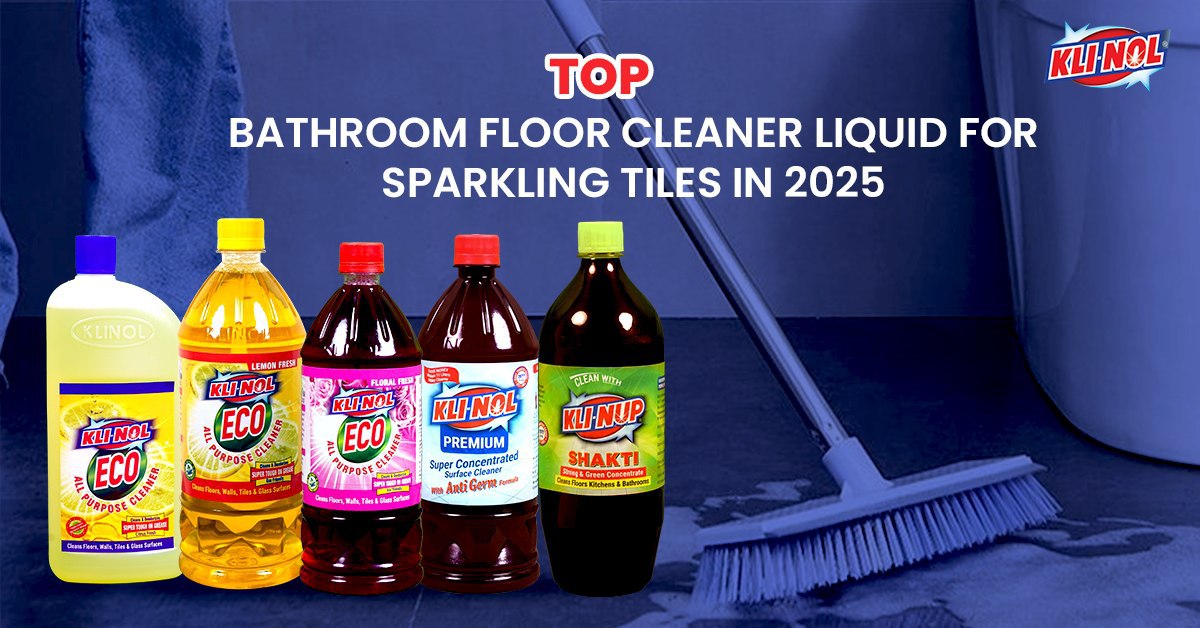Tired of slippery, stained bathroom floors despite daily cleaning? Many cleaners promise a sparkling finish but fail to eliminate hard water stains and lingering bacteria, especially in Indian homes where mineral buildup is common. Klinol Bathroom Floor Cleaner is a scientifically formulated solution that kills 99.9% of bacteria, removes tough hard water marks, and leaves tiles both marble-safe and residue-free.
In this post, we will compare floor versus wall cleaning, explain why typical cleaners often fall short, and reveal why more consumers are choosing specialized solutions. According to IMARC, “The Indian household cleaners market exceeded USD 10.3 billion in 2024, largely driven by growing demand for premium antibacterial products.”
You will also find a step-by-step guide to using Klinol effectively, helping you choose a cleaner that truly delivers results. For more expert cleaning tips, visit our Cleaning Insights or try Klinol today for spotless, safe floors.
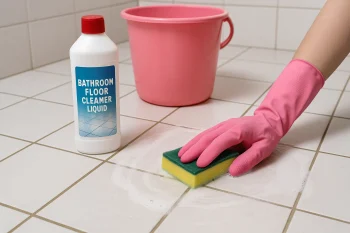
Best Bathroom Floor Cleaner
Why Use a Specialized Bathroom Floor Cleaner Liquid?
Many people use dish soap or all-purpose liquids to clean their bathrooms, but these aren’t designed to tackle the unique challenges of a wet, germ-prone space. A floor Bathroom Cleaner Liquid is specially formulated to remove soap scum, hard water stains, and bacteria from tiles and grout.
Regular household cleaners often leave behind slippery residues or cause tile discoloration. In contrast, bathroom-specific floor cleaners like Klinol’s formula are pH-balanced and safe for marble, ceramic, and vitrified tiles. They not only clean but also sanitize surfaces, reducing risks of infection, mildew, and foul odors.
Using a bathroom floor cleaner liquid regularly also preserves the shine of your flooring and prevents the buildup of slippery film. Most of these liquids come with fresh fragrances that eliminate bad smells, leaving your washroom smelling pleasant. If you have children, pets, or elderly at home, investing in a non-toxic, eco-friendly formula provides extra peace of mind.
In short, switching to a targeted bathroom cleaning solution ensures deeper hygiene, longer tile life, and better safety, all with less effort.
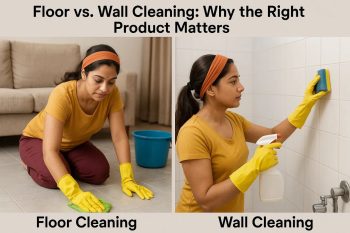
Floor vs Wall Cleaning
Floor vs Wall Cleaning: Why the Right Product Matters
Even though water, soap and dirt impact both the floor and walls in the bathroom, their materials and how they are cleaned are not the same. All of the day-to-day mess, accumulated particles, harsh water marks and slick spots damage bathroom floors the most. Soap scum collects on walls which means they do not need to be disinfected often.
| Feature | Bathroom Floor | Bathroom Wall |
| Exposure | Foot traffic, stagnant water, and dirt | Soap Scum, Steam |
| Cleaning Need | Deep Disinfection, slip resistance | Milk cleaning, odour control |
| Product Type | Klinol bathroom floor cleaner liquid | Surface sprays |
| Key Risk | Slipperiness prevention, bacteria buildup | Mold growth |
It’s necessary to understand that cleaning floors calls for stronger cleaners. Cleaners for walls can do with basic detergent, but bathroom floors should be cleaned with liquids that have powerful floor disinfectants and keep the floor from getting slippery.
Don’t swap washing the walls with cleaning the floor, since using a wall tile floor cleaner spray instead of the recommended floor cleaner may harm your flooring. It might cause your feet to lose their grip and thus put you at greater risk of falling.
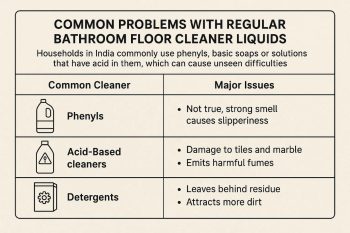
Problems with Regular Bathroom Floor Cleaner
Common Problems with Regular Bathroom Floor Cleaner Liquids
Households in India commonly use phenyls, basic soaps or solutions that have acid in them, which can cause unseen difficulties.
| Common Cleaner | Major Issues |
| Phenyls | Not true, strong smell, causes slipperiness |
| Acid-Based cleaners | Damage to tiles and marble emits harmful fumes |
| Detergents | Leaves behind residue, attracts more dirt |
It helps to analyse the main issues in depth:
- Slipperiness: A lot of generic cleaners leave a slippery surface once you have cleaned, which can be very dangerous. For these reasons, heavy TVs should be avoided by people with seniors or kids at home.
- Providing no real disinfection: Flavoured products may only conceal foul odours, even though they provide no protection against bacteria. It is still possible for germs and bacteria to remain even after cleaning.
- Streaks and cloudiness: Tiles become dull and marked when acidic or too strong cleaning products are used. Such products usually leave behind slight streaks.
- Damage to marble and natural stone: A scene can leave permanent damage to marble and natural stone when some cleaners react with them.
- Lingering chemical smell: Chemical aromas from cleaning products. Because regular cleaners have such a strong chemical smell, they should not be used in small spaces like bathrooms.
- Environmental concerns: Many of these cleaners contain chemicals that are not biodegradable and so can spoil water supplies and hurt living creatures found in the water.
Klinol Bathroom Cleaners | Feature & Advantages
Klinol delivers a fresh approach to Indian bathroom fixtures. It doesn’t only clean, but also ensures good health and safety, making it much more useful than plain cleaners.
| Feature | Klinol Advantage |
| Antibacterial | Kills 99.9% of bacteria and viruses |
| Shine | Leaves a streak-free shine every time |
| Safety | Slipperiness prevention for better grip |
| Compatibility | Marble safe, tile friendly, residue free |
| Fragnance | Mild,plant-based essential oil fragrance |
| Eco-Friendly | Biodegradable liquid and recyclable packaging |
Additional Advantages:
- Klinol includes no acid, bleach or harsh fumes in its balanced pH composition.
- After you have rinsed the floors, they are totally safe for both children and pets who might crawl on them.
- This wax works on ceramic, vitrified, marble, granite and terrazzo floor coverings.
In case of water stains, mould that forms around tile edges or buildup from soap, you should use Klinol.
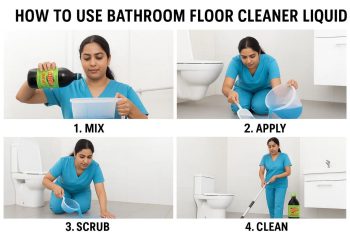
How to Use Bathroom Floor Cleaner
How to Use Bathroom Floor Cleaner Like a Pro
| Step | Action |
| Step 1 | Pre-rinse the bathroom floor with warm water to loosen dirt |
| Step 2 | Mix 1 capful of Klinol with 2 litres of water for routine cleaning |
| Step 3 | Mop or scrub thoroughly, especially grout areas |
| Step 4 | Let the solution sit for 5 minutes to activate its antibacterial gel |
| Step 5 | Optional light rinse (especially for marble) |
| Step 6 | Dry with a microfiber cloth to a streak-free result |
When you are deep cleaning, you should:
- Apply Klinol without diluting it on areas that have mould or stains.
- Wait for 10 minutes before you start scrubbing.
- Clean the surface softly and dry it to make it shine again.
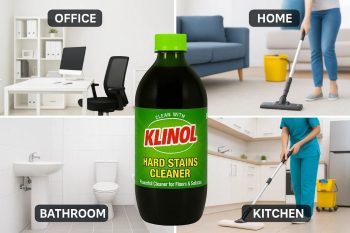
Use of Bathroom Cleaner
Tips for Using Bathroom Floor Cleaning Liquid for Best Results
- Each week, do a thorough cleaning of your floors with neat Klinol, even if you mop daily.
- Making sure there is enough air movement is important while tidying up. It prevents mould and makes things dry more quickly.
- When using Klinol, wear protective gloves since it’s always a safe habit.
- Do not use Klinol together with any acid-based cleansers or bleach because it will make Klinol less effective.
- Make sure to check which type of floor it is and, on rare surfaces, test some product on a small area before using it on the whole floor, mainly on smooth, polished stone.
- Choose a modern mop that doesn’t hold dirt-filled water. Go for a microfiber or flat mop for better wipe-up jobs.
Conclusion
Since your family’s health and your bathroom’s stylish look are important, deciding on the right bathroom eco cleaner liquid matters a lot to Indian homes. Klinol is a good option because it is antibacterial, marble safe, and offers slipperiness prevention, leaving a streak-free shine. It is safe to use, cleans fast and is made for Indian floors.
With ceramic tiles, textured anti-skid floors or premium marble, this tile floor cleaner will get each area spotless. If you wish to enhance your cleaning routine with a better option that gives instant and great results, Klinol is the answer for 2024.
For more insights into the rise of household cleaner usage in India, you can read the full article here: Rise in household toilet cleaner usage: Impact of Swachh Bharat Abhiyan Go ahead and start using Klinol now. Shiny tiles and more secure floors are ready for you.
FAQ’s
1. What is the best bathroom floor cleaner liquid for Indian bathrooms?
The best bathroom floor cleaner liquid for Indian homes is one that offers antibacterial protection, slipperiness prevention, and a streak-free shine. Klinol fits all these criteria and is also marble safe and residue-free, making it ideal for Indian tiles and hard water conditions.
2. Can I use tile floor cleaner on marble surfaces?
Not all tile floor cleaners are marble safe. Klinol is specially designed to clean a variety of surfaces like marble, granite, and ceramic without damaging their finish, thanks to its balanced pH and non-acidic formula.
3. Is Klinol a good floor disinfectant for bathrooms?
Yes, Klinol acts as a powerful floor disinfectant that kills 99.9% of germs and viruses. Unlike regular phenyls or acid-based cleaners, it is safe for daily use and supports a hygienic and odour-free bathroom environment.
4. Does Klinol help with slipperiness prevention on bathroom floors?
Absolutely. Klinol is formulated with slipperiness prevention properties, making it ideal for households with kids or elderly members. It reduces the risk of accidental slips after mopping.
5. Will the cleaner leave a residue or streaks on tile floors?
No. Klinol provides a residue-free, streak-free shine every time you clean. Unlike conventional soaps or acid-based solutions, it leaves tiles clean and clear without sticky or cloudy marks.

